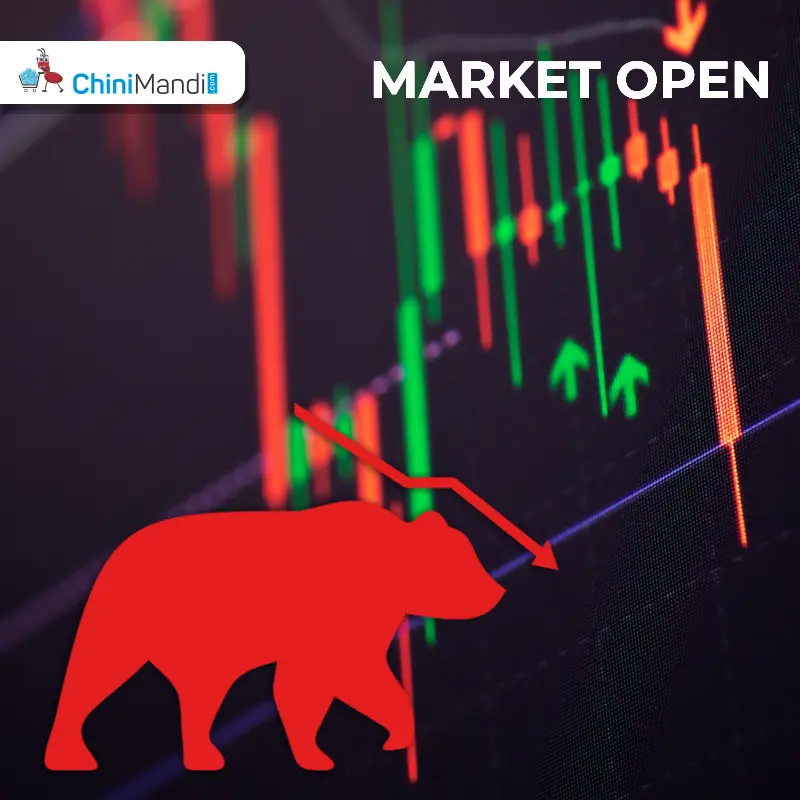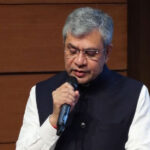Mumbai (Maharashtra): Indian stock markets opened sharply lower on Thursday, witnessing a major sell-off after US President Donald Trump announced a 25 per cent tariff on Indian goods, along with penalties on purchases of Russian crude and defence equipment.
The move has triggered widespread concern among investors and raised fears of a slowdown in exports and overall business sentiment.
At the opening bell, the NIFTY 50 index dropped to 24,642.25, falling by 212.80 points or 0.86 per cent. The BSE Sensex also declined sharply, opening at 80,695.50 after losing 786.36 points or 0.97 per cent.
At 10:15 am, Sensex was trading 608.49 points down at 80,873.37, whereas Nifty 178.25 points lower at 24,676.80.
The bearish sentiment extended across the broader market indices as well, with Nifty Midcap 100 falling more than 1 per cent and Nifty Smallcap 100 also down by 1.01 per cent during the opening session.
According to market experts, while the impact of the US tariff announcement is expected to be short-term, India needs to take immediate steps to boost domestic consumption, as its exports will be hit. This could potentially impact business confidence and slow down the economy.
Ajay Bagga, a banking and market expert, told ANI, “The 25 per cent punitive tariffs on India with the threat of secondary tariffs due to buying Russian oil will have a short-term impact on Indian markets. India exports USD 87 billion of goods to the US while importing USD 45 billion of goods from the US.”
He further pointed out that sectors such as electronics, smartphones, textiles, gems and jewellery, leather goods, engineering goods, seafood, and chemicals will be significantly impacted at these tariff levels.
“Hopes are high that this is yet another maximalist posturing by Trump, and like with the EU, Japan and Korea, the final tariffs will be nearer to 15 per cent,” Bagga added.
However, he also noted that India’s position is different from other countries due to its reluctance to open the agricultural and dairy sectors to US genetically modified exports.
Citing South Korea’s example, Bagga said that despite having a free trade agreement with the US since 2012, Korea was initially threatened with a 25 per cent tariff and finally settled for a 15 per cent tariff in return for 0 per cent tariff access for US goods.
He emphasized the need for urgent economic reforms, saying, “India will find it tough to get a lower tariff deal done. The urgent need is to massively deregulate, boost domestic consumption by GST cuts and stimulus, and to protect Indian exporters and their supply chains as they seek other markets or recalibrate to serve the domestic market.”
Bagga also warned about the possible rise in oil prices due to reduced availability of Russian oil in the global supply chain.
“The impact on India’s Balance of Trade and Current Account Deficit needs to be watched as potentially 18 per cent of India’s total goods exports are now covered by these tariffs. The sentiment weakening could translate into economic weakness, hence the urgent need for fiscal and monetary stimulus measures along with a 1991-style massive deregulation to unleash animal spirits in the Indian economy,” he said.
Among sectoral indices on the NSE, Nifty Oil and Gas witnessed the highest selling pressure, down 1.48 per cent, followed by Nifty Consumer Durables, which declined by 1.42 per cent. Nifty Auto and Nifty Pharma also dropped by more than 1 per cent, with all major sectors trading in the red at the time of reporting.
Vikram Kasat, Head – Advisory at PL Capital, said that the recent low of 24,598 on Nifty will act as a crucial support level. “Breaking below 24,598 can drag the Nifty index lower towards the 24,450-24,500 zone, which is a major support zone for the Nifty,” he said, adding that the IT sector could emerge as a possible indirect beneficiary of INR depreciation.
On the political front, Kasat remarked, “Politically, the relationship is in its toughest spot since the mid-1990s. Trust has diminished. President Trump’s messaging has damaged many years of careful, bipartisan nurturing of the U.S.-India partnership in both capitals.”
Meanwhile, several major companies are scheduled to release their Q1 earnings results today, including Hindustan Unilever, Sun Pharmaceutical Industries, Maruti Suzuki India, Adani Enterprises, Coal India, Vedanta, Ambuja Cements, Eicher Motors, TVS Motor Company, Cholamandalam Investment and Finance Company, Mankind Pharma, Swiggy, Dabur India, JSW Energy, and PB Fintech.
Asian markets were trading mixed on Thursday. Japan’s Nikkei 225 surged 0.7 per cent, while Singapore’s Straits Times index declined 0.66 per cent. Hong Kong’s Hang Seng index dropped 1.38 per cent, South Korea’s KOSPI index was down 0.39 per cent, and Taiwan’s Weighted Index gained 0.34 per cent.
(With inputs from ANI)
















